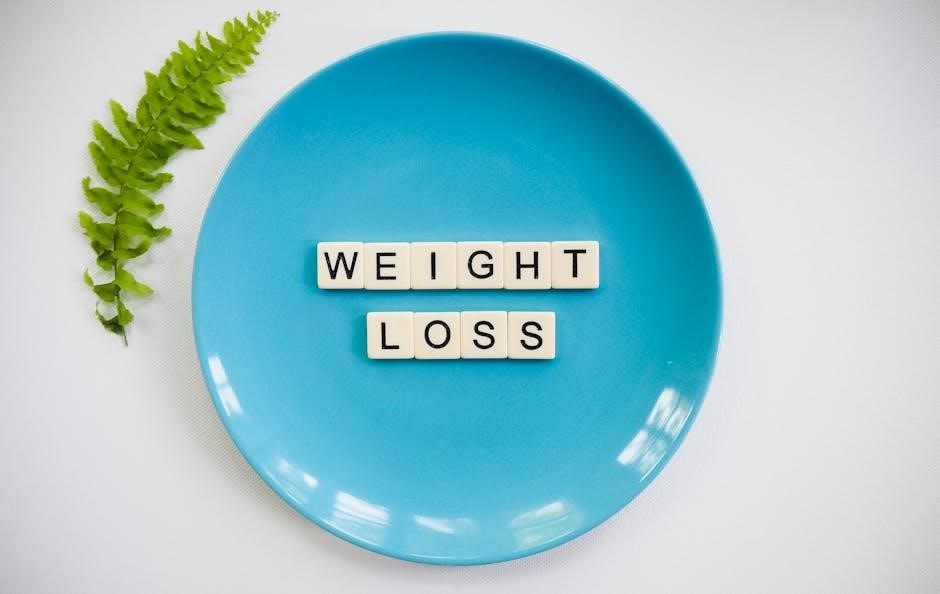Fatty liver disease occurs when excess fat accumulates in liver cells, often due to non-alcoholic factors. Diet plays a crucial role in managing the condition, helping reduce liver fat and inflammation while promoting overall health.
1.1 What is Fatty Liver Disease?
Fatty liver disease occurs when excess fat accumulates in liver cells, often unrelated to alcohol consumption. It can progress from simple fat accumulation to inflammation and scarring, potentially leading to severe liver damage if left untreated. Diet and lifestyle changes are critical in managing the condition and preventing progression.
1.2 Importance of Diet in Managing Fatty Liver
Diet plays a pivotal role in managing fatty liver disease by reducing liver fat and inflammation. A balanced diet rich in fruits, vegetables, whole grains, lean proteins, and healthy fats helps improve liver health. Avoiding refined carbs, sugary foods, and processed items is essential to prevent disease progression and support overall well-being.
Understanding the Causes and Risk Factors
Fatty liver disease is often linked to excess fat accumulation in liver cells, primarily due to obesity, insulin resistance, high cholesterol, and metabolic syndrome. Lifestyle factors like poor diet and lack of exercise contribute significantly to its development.
2.1 Non-Alcoholic Fatty Liver Disease (NAFLD)
Non-Alcoholic Fatty Liver Disease (NAFLD) occurs when excess fat builds up in the liver without alcohol use. It ranges from simple fatty liver to Non-Alcoholic Steatohepatitis (NASH), which can progress to cirrhosis. NAFLD is linked to obesity, insulin resistance, and metabolic syndrome, often requiring lifestyle changes and dietary adjustments to manage effectively and prevent complications.
2.2 Role of Diet and Lifestyle in Developing Fatty Liver
A high-fat, high-sugar diet and sedentary lifestyle significantly contribute to fatty liver development. Consuming refined carbs, fried foods, and excessive saturated fats can lead to fat accumulation in the liver. Obesity and insulin resistance, often linked to poor dietary habits, further exacerbate the condition, highlighting the importance of lifestyle modifications in prevention and management.

Key Principles of a Fatty Liver Diet
A fatty liver diet focuses on whole, unprocessed foods, avoiding sugary and high-fat items. It emphasizes balanced nutrition, portion control, and healthy fats to support liver health.
3.1 Mediterranean Diet and Its Benefits
The Mediterranean diet, rich in fruits, vegetables, whole grains, and healthy fats like olive oil, is highly beneficial for fatty liver management. It reduces liver inflammation, improves insulin sensitivity, and promotes weight loss, all of which are crucial for managing fatty liver disease effectively.
3.2 Focus on Whole, Unprocessed Foods
Emphasizing whole, unprocessed foods like vegetables, lean proteins, and whole grains is essential for managing fatty liver. These foods provide essential nutrients, reduce fat accumulation, and minimize inflammation, supporting a healthier liver and overall well-being.
3.3 Portion Control and Balanced Nutrition
Practicing portion control ensures you consume the right amount of nutrients without overloading your liver. A balanced diet includes lean proteins, whole grains, and healthy fats, providing sustained energy and reducing fat accumulation. This approach supports liver function, aids in weight management, and helps maintain overall metabolic health effectively.

Best Foods to Include in Your Diet
Fatty liver diet plans emphasize fruits, vegetables, lean proteins, and healthy fats. These foods support liver health, reduce inflammation, and promote balanced nutrition for optimal well-being.
4.1 Fruits and Vegetables
Fruits and vegetables are rich in antioxidants, fiber, and essential nutrients, making them a cornerstone of a fatty liver diet. They help improve digestion, reduce inflammation, and support liver function. Incorporating a variety of colorful fruits and vegetables daily can enhance overall health and promote sustainable weight management for liver wellness.
4.2 Lean Proteins and Plant-Based Options
Lean proteins, such as poultry, fish, and plant-based options like legumes and tofu, are essential for reducing liver fat and promoting healing. These foods provide essential amino acids and nutrients while minimizing saturated fats, making them a key component of a balanced fatty liver diet to support overall liver health and function.
4.3 Healthy Fats and Omega-3 Rich Foods
Healthy fats, such as avocados, nuts, seeds, and olive oil, support liver health by reducing inflammation. Omega-3-rich foods like fatty fish (salmon, mackerel) help lower liver fat and improve cell repair. Incorporating these into your diet promotes balanced nutrition and supports fatty liver management, aiding in overall liver function and well-being.

Foods to Avoid
Refined carbs, fried foods, processed snacks, and sugary items worsen fatty liver. Limit alcohol, saturated fats, and spicy foods to reduce liver inflammation and promote healing.
5.1 Refined Carbohydrates and Sugary Foods
Refined carbs, like white bread and pasta, and sugary foods can increase liver fat. They cause insulin spikes, promoting fat storage. Limiting these helps reduce liver inflammation and supports recovery. Opt for whole grains and natural sugars from fruits and vegetables instead.
5.2 Fried and High-Fat Foods
Fried and high-fat foods, such as fries and pastries, are rich in saturated fats and calories, contributing to liver inflammation. These foods worsen fatty liver symptoms and should be avoided. Opting for baked or grilled alternatives helps reduce fat intake and supports liver health.
5.3 Processed and Packaged Foods
Processed and packaged foods are high in unhealthy fats, added sugars, and sodium, worsening fatty liver symptoms. These foods often contain trans fats and artificial additives that promote inflammation. Avoiding items like chips, frozen meals, and sugary snacks is crucial. Always read nutrition labels to identify and limit these harmful products, opting for natural, whole foods instead.
Sample 7-Day Meal Plan
This section provides a structured 7-day meal plan, including balanced breakfasts, lunches, dinners, and snacks, tailored to support liver health and manage fatty liver disease effectively.
6.1 Breakfast Ideas
Start your day with nutrient-rich options like oatmeal topped with berries and nuts, Greek yogurt with fresh fruit, or avocado toast on whole-grain bread. Smoothies made with spinach, banana, and almond milk are also excellent. Include scrambled eggs with vegetables or a chia pudding with coconut milk and berries for a balanced start.
6.2 Lunch and Dinner Options
Opt for grilled chicken or fish with steamed vegetables and quinoa. Include baked salmon with asparagus and brown rice, or tofu stir-fries with mixed greens. Add a side of roasted sweet potatoes or whole-grain pasta. Incorporate healthy fats like avocado slices or olive oil. Ensure meals are balanced and rich in nutrients to support liver health and overall well-being.
6.3 Healthy Snacks and Desserts
Choose snacks like fresh fruits, carrot sticks with hummus, or a handful of nuts. For desserts, opt for fruit salads or Greek yogurt with berries. Avoid sugary treats and processed foods. Incorporate omega-3 rich options like chia seeds. Keep portions controlled to maintain a balanced diet and support liver health effectively.
Lifestyle Changes to Support Liver Health
Regular exercise and maintaining a healthy weight are essential. Aim for 150 minutes of moderate activity weekly. This promotes fat loss and improves liver function naturally.
7.1 Importance of Regular Exercise
Regular exercise is crucial for fatty liver management. Aim for 150 minutes of moderate-intensity activity, like brisk walking, cycling, or swimming, weekly. Exercise burns fat, improves insulin sensitivity, and supports weight loss, all of which reduce liver fat and inflammation, promoting overall liver health and well-being. Consistency is key to achieving long-term benefits.
7.2 Managing Weight and Maintaining a Healthy BMI
Maintaining a healthy weight and BMI is essential for managing fatty liver disease. Even a 5-10% reduction in body weight can significantly reduce liver fat and inflammation. Aiming for a BMI of 18.5-24.9 through a combination of diet and exercise helps improve metabolic health and supports liver function. Consult a healthcare provider for personalized weight management strategies.
Monitoring Progress and Adjustments
Regularly tracking liver health markers, such as liver enzymes and imaging tests, helps assess progress. Adjustments to diet and lifestyle should be made based on these results.
8.1 Tracking Liver Health Markers
Monitoring liver health involves regular blood tests for enzymes like ALT and AST, and imaging studies to assess fat accumulation. These markers help gauge the effectiveness of dietary changes and lifestyle modifications, ensuring adjustments are made to support liver recovery and prevent further damage.
8.2 When to Consult a Healthcare Provider
Consult a healthcare provider if you experience symptoms like abdominal pain, fatigue, or jaundice. They can assess liver damage and recommend further testing or treatment. Regular follow-ups ensure personalized dietary adjustments and monitor progress, preventing complications and promoting long-term liver health effectively.

Supplements and Additional Support
Certain supplements like omega-3 fatty acids and vitamin D can support liver health. Probiotics may also aid gut health, enhancing overall digestion and nutrient absorption effectively.
9.1 Omega-3 Fatty Acids and Vitamin D
Omega-3 fatty acids, found in fish and flaxseeds, help reduce liver fat and inflammation. Vitamin D supports liver function and overall health, enhancing the benefits of a fatty liver diet plan.
9.2 Probiotics and Gut Health
Probiotics support gut health, improving digestion and reducing inflammation linked to fatty liver disease. A healthy gut microbiome aids in reducing liver fat accumulation and promoting overall metabolic balance, enhancing the effectiveness of a fatty liver diet plan.
Emotional and Mental Support
Emotional well-being is crucial for managing fatty liver disease. Stress management and a strong support system can enhance motivation and adherence to a healthy diet plan.
10.1 Managing Stress
Managing stress is essential for overall well-being, especially when managing fatty liver disease. Techniques like meditation, yoga, and deep breathing can help reduce stress levels and improve mental clarity. Chronic stress can negatively impact liver health, so incorporating stress-reducing activities into your daily routine is crucial for supporting your fatty liver diet plan and overall health.
10.2 Building a Support System
Building a support system is vital for managing fatty liver disease. Family, friends, and support groups can provide emotional encouragement and practical help. Sharing your journey with others who understand your challenges can foster accountability and motivation. A strong support network can also help you stay committed to your diet plan and lifestyle changes.
Adhering to a balanced diet and healthy lifestyle is crucial for managing fatty liver disease. Stay committed to your plan for long-term liver health and well-being.
11.1 Summary of Key Recommendations
11.2 Encouragement for Long-Term Commitment
Embrace your journey toward better liver health with patience and perseverance. Celebrate small victories and remember, consistency is key. The benefits of a healthy diet and lifestyle far outweigh short-term challenges. Stay committed, and over time, you’ll see improvements in your overall well-being and liver health. Keep going—you’re making a lasting impact on your life!
